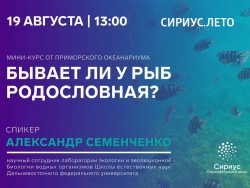The educational center “Sirius” and the Primorsky Aquarium launch a new online course

On August 19, the educational center started publishing a new online course on its YouTube channel. The course is prepared by staff members of the Primorsky Aquarium and includes 4 lectures given in Russian.
In the first lecture entitled “Do fish have a pedigree?”, Alexander Semenchenko, Staff Scientist at the Laboratory of Ecology and Evolutionary Biology of Aquatic Organisms, School of Natural Sciences, Far Eastern Federal University, tells how DNA helps to obtain reliable data on the dispersal routes of freshwater fauna in the southern Far East of Russia, and if climate and relief of land, ocean floor and seabed influence the distribution of freshwater fishes in the Amur basin.
“How freshwater fish colonized the Russian Far East during the Cenozoic era” is the topic of the second lecture. Specialist at the Education Department of the Primorsky Aquarium, Anastasia Perfilieva, tells how climate affected the species composition in freshwater ecosystems of the region in the Cenozoic Era (approximately 66 million years ago), and why fish migrated to new areas. She also explains if sea-level fluctuations and Earth’s crustal motions had an impact on biodiversity, and why the present-day fishes of the Russian Far East look like they do.
The third lecture acquaints students with fish species inhabiting the Amur River and lakes Khanka and Baikal, as well as with the Aquarium’s collections. Anatoly Semenchenko, Head of the Department of the Russian Far East Freshwater Organisms at the Primorsky Aquarium, shares what his team of specialists has found out about the life, behaviour and biology of rare fishes, and what has yet to be discovered.
The fourth lecture
– “Where did ornamental fish keeping begin?” – describes how, in different
epochs, fish were kept in artificial environments in China, Rome and Babylon.
The audience can learn about how, according to scientists, aquarium fish affect
the human psyche, what mistakes aquarium beginners usually make and how to
avoid them. The lecture is delivered by Platon Ostashkin, Senior Specialist at
the Education Department of the Primorsky Aquarium.
In addition to the online course, school children and university students have
an opportunity to participate in research activities by the A.V. Zhirmunsky National
Scientific Center of Marine Biology, Far Eastern Branch, Russian Academy of Sciences, within the “Sirius. Summer: Start your project”
program. Children will explore
freshwater fish of the Russian Far East, gain an insight into their captive
care requirements and help to develop effective solutions for protecting the
species and their habitats. The program
participants will work on their assignments throughout the upcoming school
year.